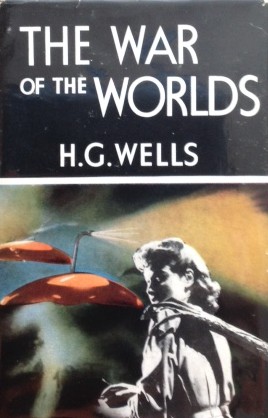Inspiring Older Readers
 posted on 24 Aug 2016
posted on 24 Aug 2016
The War of the Worlds by H.G. Wells
It’s odd the way that certain stories embed themselves into our cultural consciousness and, as a result, feel like they’ve always been around. The War of the Worlds is certainly one of these and it feels more like a modern fairy tale than a piece of science fiction. This feeling that you are reading something that has become an archetype is only enhanced by the fact that each generation seems to be able to update the tale and keep it relevant to the times they live in.
So there is a danger that you think you’ve read the book when in fact you haven’t – you might have seen one of the movies or even heard radio adaptations but that is, in reality, quite a different experience. It’s easy to forget that The War of the Worlds is actually a piece of fin de siècle literature – first published in 1898, the same date as arch Victorians Henry James (Turn of the Screw) and Arnold Bennett (A Man From The North). However, these were changing times and a growing fascination with the modern world of scientific progress was influencing writers like Jules Verne and M.P. Shiel and Wells’ masterpiece comes at the end of a decade in which he explored a whole range of issues that we now think of as science fiction – The Time Machine (1895), The Island of Dr Moreau (1896) and The Invisible Man (1897).
The idea that scientific discovery could lead us to disaster as well as providing seemingly endless progress was a millennial concern for the intellectuals of the time and there was considerable public debate about whether ‘progress’ would produce a utopia or a dystopia – something Wells confronts directly in his later 1933 story The Shape of Things To Come. However, the 1890s was a time of feverish possibilities and a decade of extraordinary breakthroughs in astronomy that Wells would have been more than aware of. Konstantin Tsiolkovsky published his first article on the possibility of space flight and his greatest discovery was that a rocket, unlike other forms of propulsion, will work in a vacuum – something that may have given Wells the intellectual underpinning for his core idea of a Martian invasion.
So, coming to the book itself, I was quite surprised to discover how much of the original story survives in the films and adaptations that we’ve become accustomed to. The plot is familiar – a series of meteorite landings turn out to be a Martian invasion force that is intent of domination of Earth and its resources. The Martians themselves are technically advanced and, on landing, construct great tripod machines - in which they are housed - that brush aside all of Earth’s defences and set them on the path to rapid victory. Nothing seems capable of bringing them to a halt until they contract simple infections that humans are immune to but which prove deadly to the invaders. So Earth is saved, not by the sophistication of the human being but through the simple action of the most basic natural organisms.
What is surprising in the book is the focus of the narration. The story is told through the eyes of an unnamed narrator and – for part of the book – by his brother. The primary narrator is a married man and writer living in suburban London and the vast majority of the action takes place in London’s outer suburbs and that area we now know as Greater London. The Martians are seen very early in the book as rather shapeless forms that are inhibited by the Earth’s gravity and atmosphere – hence the need for them to move around in their tripods which are alarmingly equipped with destructive heat-rays ( what I suspect today he would have called laser beams). Wells is actually disturbingly matter of fact and even brutal in his depiction of the casual ease with which the Martians slaughter their human opponents.
Quite a lot of the action centres on survival against the odds and the way the trauma of the invasion affects the behaviour of people in extremis - this forms the core of the episodes involving his brother. Wells also takes the chance to have a good prod at the church, belief in God and the hypocrisy of the clergy. Contemplating the destruction of human society and the harvesting of human beings as food enables Wells to consider the nature of the society that is being destroyed and – subsequently - what has been learned when it becomes clear humanity will need to rebuild itself. The reunion of the narrator with his wife at the end allows Wells to provide a more positive ending than might have been expected and to signal his own optimism for human values like loyalty, endurance and love.
The book was a pleasant surprise because I didn’t expect to discover the voice of an essentially 20th century man writing in the 19th century. Wells was an extraordinary polymath and a writer of some skill and as a result, refreshingly, the book was a more satisfying experience than either of the film adaptations I have seen.
Terry Potter
August 2016